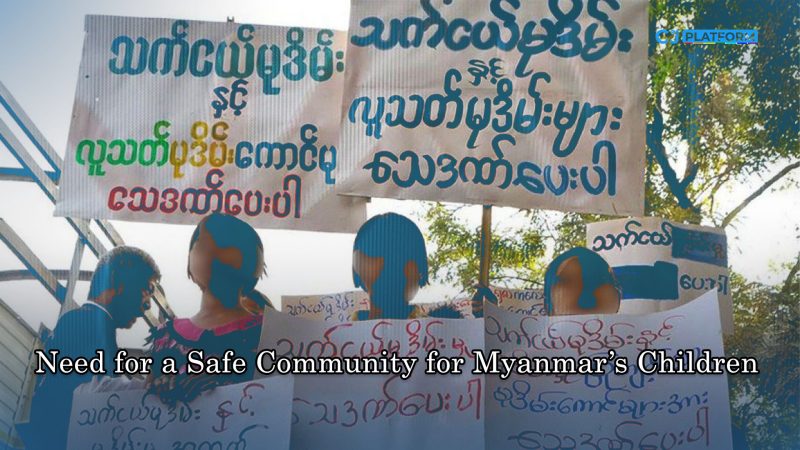Need for a Safe Community for Myanmar’s Children

A crowd gathered around the body of a young girl, covered in stab wounds and bruises, in a rubber plantation near Kyar Inn Seik Village, Hlegu Township, Yangon.
The five-year-old had been brutally murdered after her mother left her with neighbors to take her older brother to school.
Local media reported that the accused, Zin Lin Htike—a man from the same village—took the girl while the neighbors were asleep, raped her, and then killed her.
The June 5 incident underscores the growing insecurity facing children in a country ravaged by political and military conflict.
Sadly, this case is not isolated. Across Myanmar, many children have been raped and left vulnerable in unsafe communities.
Available data shows that since early 2025, over 10 cases of rape involving children aged 2 to 16 have been reported.
According to the Burma Women’s Union (BWU), 23 cases of rape against children aged 5 to 18 were recorded in 2024 across Sagaing, Magway, Ayeyarwady, Bago Regions, and Karenni (Kayah) State.
“These are only the reported cases—the actual numbers could be much higher,” said Ma Wai Wai, Joint Secretary of BWU.
Amid political instability and the collapse of rule of law, Myanmar’s children are increasingly exposed to sexual violence, even in supposedly safe spaces like homes and schools. Strong legal protections and comprehensive sex education are urgently needed to safeguard them.
In April 2024, a horrific rape case in Thaton Township, Mon State, involved a victim just 1 year and 8 months old.
The child was assaulted by her uncle while her parents were away and then dumped in a gutter, presumed dead.
Miraculously, she survived. However, a psychologist providing counseling warned that the trauma could haunt her for life. She will need long-term psychological support and compassionate care to heal.
The absence of comprehensive sex education in Myanmar remains a key factor behind the rising cases of sexual violence, particularly child rape.
Women’s rights activists note that perpetrators take advantage of children’s and adolescents’ lack of sexual knowledge, leaving them more vulnerable to abuse. Compounding the problem, victims’ families often remain silent due to Myanmar’s pervasive victim-blaming culture.
“Victimized children face not just physical trauma but also emotional scars and social stigma,” explained women’s rights activist Ma Ngal Ngal. “This double burden makes recovery significantly harder and severely impacts their future prospects.”
Recent reports from Save the Children and UNICEF reveal that violence against children – including rape and murder – has at least doubled since Myanmar’s military coup. Alarmingly, most child rape cases involve unexpected perpetrators: neighbors, relatives, or acquaintances.
A shocking January 2024 case saw an interim school principal in Moke Ka La Village, Bago Region, sexually assault 48 students aged 7-15. While child rape isn’t a new phenomenon in Myanmar, the current situation represents a crisis, with social media flooded by reports of missing and murdered children.
“The failing judicial system, combined with ineffective laws, directly contributes to escalating sexual violence against women and children,” noted BWU Joint Secretary Ma Wai Wai.
Myanmar’s Penal Code (Section 376) currently mandates 20 years to life imprisonment for raping girls under 12 or disabled women – a stark contrast to many countries that impose the death penalty for child rape (Myanmar’s maximum sentence being just one year).
However, a landmark May 22 ruling saw the Taungoo District Court sentence two men to death for raping and murdering a 16-year-old student in Bago Region – the first such capital punishment for child rape in Myanmar’s history, according to a CDM judge.
On the same day, perpetrators who raped and murdered two young girls in a United Wa State Army-controlled area were also sentenced to death.
The number of such punishments remains extremely low compared to the total cases of child rape, leaving children’s safety threatened daily at alarming levels according to women’s and children’s rights activists.
In this situation, activists emphasize the need to document sexual abuse cases and provide redress for children’s health and psychological damage. Legal experts and rights activists specifically argue that maximum penalties for perpetrators are necessary to reduce child rape cases.
A CDM judge noted, “There is no rule of law in Myanmar – the regime itself kills people, giving those with bad behaviors license to commit crimes as they please.” It was also found that in some rebel-controlled areas, perpetrators often escape punishment as child rape cases prove difficult to solve.
Survivors are calling for communities to create safe, law-abiding environments to prevent tragedies like the Hlegu case where a child was left vulnerable at home.
Ma Wai Wai, BWU joint secretary, stressed: “We must now work together to protect children from sexual violence and rape.”

